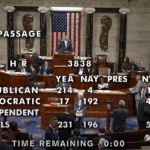
Of nearly $400 million the federal government provided states last year for strengthening their election systems, more than a third of the funds are planned to be spent on cyber security, the chairman of a House spending panel said on Wednesday. Another 25 percent of the $380 million appropriated in fiscal year 2018 is being used to buy new voting equipment, Rep. Mike Quigley (D-Ill.), chairman of the House Appropriations Subcommittee on Financial Services and General Government, said at the…

 By
By 








